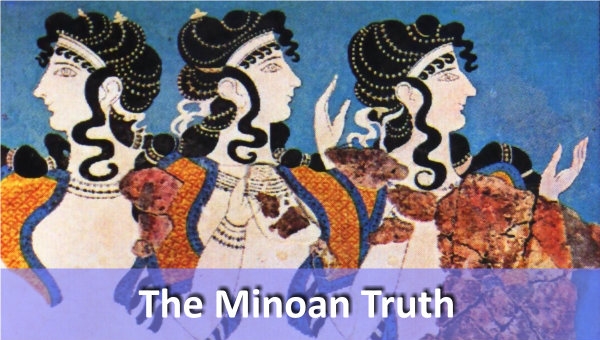By Tyson Thorne

Sitting at home one evening, watching Expedition Unknown, I’m captivated by the historical mystery being presented about an empire that vanished over 4,000 years ago. Not only is their empire lost to civilization, but so is their name; archaeologists refer to them by their most famous king, Minas, and call them Minoans. What little they left behind tells us they were an advanced society (they invented one of the first written languages), had their capital on Crete, and excelled at architectural engineering and seamanship. Their religion centered around the bull, but other than these few facts they remain unclaimed in history.
Or are they? I wondered, since this great empire existed in the Greek islands and they used their navy to trade with people on the mainland, if maybe these people were mentioned in the Bible. I mean they had to be, right? The timeline for their existence, roughly between 5000 and 4000 years ago, lines up nicely with the period of the patriarchs. Maybe Abraham, Isaac or Jacob had experiences with this lost civilization. Of course the Bible wouldn’t refer to them as Minoans, since that name wasn’t coined until the twentieth century, but I was betting there would be a clue as to identifying them.
According to the TV show, hosted by Josh Gates, the Minoan’s disappearance was likely caused by the eruption of a nearby volcano. The resultant tidal waves would have destroyed their navy and the volcanic winter that likely followed would have killed their crops. The people of Crete would have been devastated and, possibly for the first time in their existence, vulnerable and in need of assistance. Today such nations receive aid packages from wealthy countries, but back then they were conquered.
Usually when a nation is defeated and taken into captivity, the victor destroys the culture of their victims. But in some cases, as certainly happened with the Greeks, the conquering nation has such respect for the culture that they blend it into their own. A couple hundred years after the fall of the Minoans there is a people on Crete, a civilization that has its own navy and holdings on the mainland at various ports of trade just like the Minoans. One of their God’s is Ba’al, the god represented by the bull, just like the Minoans. All in all, it’s a good bet that these are the successors to the Minoan empire, and they existed alongside Israel’s most memorable kings: Saul, David, Solomon and later. They were called “Philistines”. So we have a pretty good idea of what happened to the Minoans, but were they ever mentioned in the Bible?
Among those who don’t believe the Bible to be the Word of God, or even respect its account of history, has been the argument that the Bible sometimes gets things wrong. One example they point to is that the Philistine’s are represented in the book of Genesis as having dealings with Abraham and Isaac, yet they weren’t a nation until much later in history (around 900-1000 years later!). Sure, the timeline might be too early for the Philistines of king David’s time, but the parallels between the two cultures – including their capitol on Crete – are enough to make one wonder. What if the word “Philistine” is a Hebrew term – or even a proto-Hebrew word -- referring to any people that come from Crete? If so, then the Bible may be the only historic account of this mysterious empire.
The Minoan-Philistines are mentioned in Genesis 21:32–34; 26:1, 8, 14–15; and in Exodus 13:17; 15:14; 23:31. Read up and judge for yourself, but I think these verses paints a picture that fits nicely with what little we know of the Minoan people. Which means the Bible, once again, is validated in its representation of historic truth and provides insight into a vanished empire.
|
|
